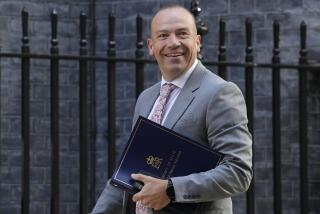Blair Offers Bill to Salvage N. Ireland Pact
- Share via
LONDON — Fighting to save the beleaguered Good Friday peace accord, Prime Minister Tony Blair on Monday unveiled a bill to ensure that the Irish Republican Army cannot keep its guns and share power in a new Northern Ireland government.
The legislative “fail safe” is Blair’s latest, and perhaps last, attempt to persuade Ulster Unionist Party chief David Trimble to form a government this week with the IRA’s political wing, Sinn Fein, before the IRA begins to relinquish its weapons.
But after meeting with Blair for more than an hour at the prime minister’s office, Trimble remained skeptical.
“There are still continuing problems, but there are still continuing consultations going on,” Trimble said.
The negotiations are part of Blair’s high-stakes strategy to end a 14-month peace process stalemate that centers largely on the issue of disarmament.
Blair has proposed forming a Northern Ireland executive, including Sinn Fein, on Thursday and turning over powers to the panel Sunday. The IRA would have to begin disarming “within weeks” and finish the job by May.
Trimble would be first minister in the new government. He is under intense pressure from Blair and President Clinton on one side--both of whom want to push the peace process forward--and from hard-liners in his own party on the other, who insist that Sinn Fein should not be allowed into the executive before the IRA relinquishes at least some of its weapons.
Blair, Irish Prime Minister Bertie Ahern and the head of the independent commission on disarmament, Canadian Gen. John de Chastelain, have said they believe that Sinn Fein is committed to securing IRA disarmament by the May 2000 deadline set out in the peace accord.
The peace agreement, crafted by the British and Irish governments and endorsed by the United States, aims to end 30 years of sectarian warfare between pro-British Protestant unionists and Roman Catholic nationalists who want to see Northern Ireland united with the Irish Republic.
More than 20,000 Protestants marked an important anniversary Monday with a rerouted parade near a hostile Catholic neighborhood of Belfast, the provincial capital. A huge security presence kept the event peaceful in contrast to the rioting that has plagued Northern Ireland during Protestant marches in previous years.
Each July 12, the Orange Order, Northern Ireland’s major Protestant brotherhood, commemorates a 1690 victory over Irish Catholics. British authorities refused to let a small parade go past the Catholic enclave of Lower Ormeau. In response, Belfast’s Orangemen diverted the entire parade to a park across the river.
Blair briefed Clinton and Ahern on the proposed legislation by telephone Monday.
The bill, which was being drafted throughout the day, gives DeChastelain the power to determine whether the IRA is meeting its obligations to disarm.
If he decided that the IRA was not complying, the Northern Ireland executive, the Northern Ireland Assembly and all other institutions established under the Good Friday accord would be suspended while the British and Irish governments undertook a review.
The assembly members could then be summoned to vote on further action, including the possibility of setting up an executive without Sinn Fein.
In practice, however, that would require the support of the Social Democratic and Labor Party, another Catholic nationalist party, which is unlikely to vote with the unionists against Sinn Fein.
The unionists have sought assurances from Social Democratic and Labor Party leader John Hume that he would back such a measure. The Independent, a liberal London daily, urged him Monday to speak up.
“John Hume must help clear the way for a unionist yes,” it said. “He should declare in advance that multi-party government would go ahead without Sinn Fein if the IRA reneges on the deal. . . . If he does and the unionists say yes, then the heat will be on Sinn Fein and the IRA to deliver disarmament, which is where the heat should be.”
Hume refused to commit.
In an attempt at evenhandedness, the proposed bill would allow the government to be suspended if any of the parties failed to meet their commitments. This means that, if Protestants were unfairly blocking Catholics’ access to power or the progress of committees linking Northern Ireland with the Irish Republic, a unionist party theoretically could be expelled from government.
But Sinn Fein was not buying the bill any more than the Ulster Unionists’ Trimble. Sinn Fein assemblyman Alex Maskey complained on BBC TV that Blair was “giving the unionists a veto.”
Trimble said he would be proposing amendments today.
The government wants the bill to pass through the House of Commons today and through the House of Lords, Britain’s upper chamber, on Wednesday.
Trimble is scheduled to meet with his party’s executive Wednesday and is expected to announce his decision Thursday.
More to Read
Sign up for Essential California
The most important California stories and recommendations in your inbox every morning.
You may occasionally receive promotional content from the Los Angeles Times.













